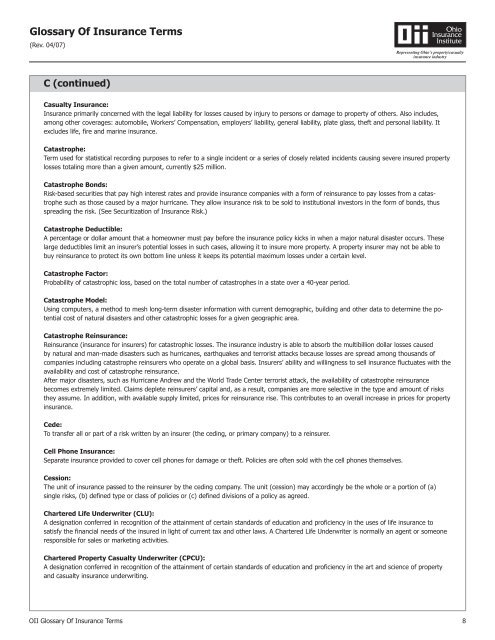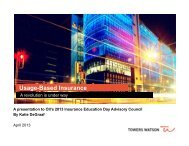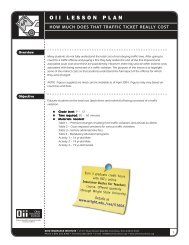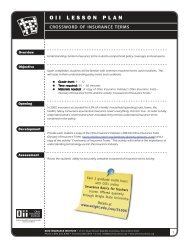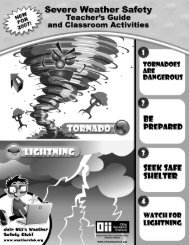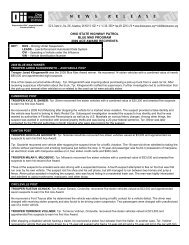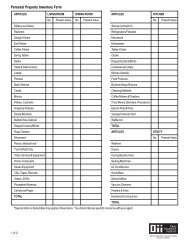Glossary Of Insurance Terms - Ohio Insurance Institute
Glossary Of Insurance Terms - Ohio Insurance Institute
Glossary Of Insurance Terms - Ohio Insurance Institute
Create successful ePaper yourself
Turn your PDF publications into a flip-book with our unique Google optimized e-Paper software.
<strong>Glossary</strong> <strong>Of</strong> <strong>Insurance</strong> <strong>Terms</strong><br />
(Rev. 04/07)<br />
C (continued)<br />
Casualty <strong>Insurance</strong>:<br />
<strong>Insurance</strong> primarily concerned with the legal liability for losses caused by injury to persons or damage to property of others. Also includes,<br />
among other coverages: automobile, Workers’ Compensation, employers’ liability, general liability, plate glass, theft and personal liability. It<br />
excludes life, fire and marine insurance.<br />
Catastrophe:<br />
Term used for statistical recording purposes to refer to a single incident or a series of closely related incidents causing severe insured property<br />
losses totaling more than a given amount, currently $25 million.<br />
Catastrophe Bonds:<br />
Risk-based securities that pay high interest rates and provide insurance companies with a form of reinsurance to pay losses from a catastrophe<br />
such as those caused by a major hurricane. They allow insurance risk to be sold to institutional investors in the form of bonds, thus<br />
spreading the risk. (See Securitization of <strong>Insurance</strong> Risk.)<br />
Catastrophe Deductible:<br />
A percentage or dollar amount that a homeowner must pay before the insurance policy kicks in when a major natural disaster occurs. These<br />
large deductibles limit an insurer’s potential losses in such cases, allowing it to insure more property. A property insurer may not be able to<br />
buy reinsurance to protect its own bottom line unless it keeps its potential maximum losses under a certain level.<br />
Catastrophe Factor:<br />
Probability of catastrophic loss, based on the total number of catastrophes in a state over a 40-year period.<br />
Catastrophe Model:<br />
Using computers, a method to mesh long-term disaster information with current demographic, building and other data to determine the potential<br />
cost of natural disasters and other catastrophic losses for a given geographic area.<br />
Catastrophe Reinsurance:<br />
Reinsurance (insurance for insurers) for catastrophic losses. The insurance industry is able to absorb the multibillion dollar losses caused<br />
by natural and man-made disasters such as hurricanes, earthquakes and terrorist attacks because losses are spread among thousands of<br />
companies including catastrophe reinsurers who operate on a global basis. Insurers’ ability and willingness to sell insurance fluctuates with the<br />
availability and cost of catastrophe reinsurance.<br />
After major disasters, such as Hurricane Andrew and the World Trade Center terrorist attack, the availability of catastrophe reinsurance<br />
becomes extremely limited. Claims deplete reinsurers’ capital and, as a result, companies are more selective in the type and amount of risks<br />
they assume. In addition, with available supply limited, prices for reinsurance rise. This contributes to an overall increase in prices for property<br />
insurance.<br />
Cede:<br />
To transfer all or part of a risk written by an insurer (the ceding, or primary company) to a reinsurer.<br />
Cell Phone <strong>Insurance</strong>:<br />
Separate insurance provided to cover cell phones for damage or theft. Policies are often sold with the cell phones themselves.<br />
Cession:<br />
The unit of insurance passed to the reinsurer by the ceding company. The unit (cession) may accordingly be the whole or a portion of (a)<br />
single risks, (b) defined type or class of policies or (c) defined divisions of a policy as agreed.<br />
Chartered Life Underwriter (CLU):<br />
A designation conferred in recognition of the attainment of certain standards of education and proficiency in the uses of life insurance to<br />
satisfy the financial needs of the insured in light of current tax and other laws. A Chartered Life Underwriter is normally an agent or someone<br />
responsible for sales or marketing activities.<br />
Chartered Property Casualty Underwriter (CPCU):<br />
A designation conferred in recognition of the attainment of certain standards of education and proficiency in the art and science of property<br />
and casualty insurance underwriting.<br />
OII <strong>Glossary</strong> <strong>Of</strong> <strong>Insurance</strong> <strong>Terms</strong> 8


